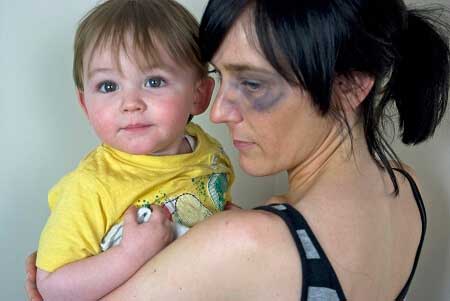Domestic Abuse Definition: Our CEO Shares Her Insights
Linda Johnson, CEO of Home-Start Central Bedfordshire, shares her insights on Domestic Abuse and the work that Home-Start does in
supporting victims of Domestic Abuse:

© Roger Bradley 2010 (posed by model)
We no longer refer to household abuse as solely domestic violence but refer to it as domestic abuse. This is because it does not always involve violence although in some situations it does. Domestic abuse refers to a whole range of controlling, abusive and otherwise unhealthy behaviours that occur in a relationship. Some victims may not even realise that they are in an abusive relationship.
Domestic abuse can escalate over time so it can become difficult to realise you are a victim. Ultimately, perpetrators seek to exercise control over their victim and this results in a range of manipulative behaviours. Here at Home-Start Central Bedfordshire we believe that it is crucial to help prevent domestic abuse because it damages the very structure of the society that we live in.
UK Charity Women’s Aid, defines domestic violence as:
“Any incident or pattern of incidents of controlling, coercive or threatening behaviour, violence or abuse between those aged 16 or over who are or have been intimate partners or family members regardless of gender or sexuality. This can encompass but is not limited to the following types of abuse: psychological, physical, sexual, financial, emotional.” – Women’s Aid, 2014.
Abusers come from all sections of society and may appear to be very nice people at face value. While it is difficult to spot an abuser there are some warning signs that can be looked out for. Abusive behaviour can include:
- Psychological Abuse such as intimidation, controlling or bullying behaviours.
- Financial Abuse could include keeping you poor and financially dependent on your partner by limiting your access to money or employment, or excessively obsessing over your finances or spending.
- Emotional Abuse such as demeaning or belittling behaviours, crossing boundaries, showing a lack of regard for your feelings or opinions.
- Isolation including stopping you from seeing your friends, family, colleagues, health workers or other people generally.
- Physical Abuse by causing bodily harm or injury. Pregnancy can be a very dangerous time for those in an abusive relationship, putting the lives of both mother and child at risk.
An abuser is someone who wants power and control over their partner and they will often achieve this in any way they can.
Our Pattern Changing Programme provides help to those who have or are experiencing domestic abuse, enabling them to recognise the behaviours associated with a potential abuser. The Pattern Changing Programme looks at how we form healthy relationships, helping victims to break the pattern of moving from one abusive relationship into another. These programmes provide practical tips helping victims to regain their confidence and self-esteem. Home-Start Central Bedfordshire also signposts on to other related services including Sorted, Women’s Aid and the Bedfordshire Police.
Domestic abuse is a very serious problem which we treat with the utmost importance. We take confidentiality very seriously to protect the victim’s identity.

© jonmann.com 2010 (posed by models)
It used to be thought that as long as children weren’t in the same room, they would not be affected by or aware of domestic abuse. It is now realised that children can be very damaged from living in an abusive household. It can have an affect on them emotionally and on their future relationships. The primary way that we learn about relationships is from our families, so it is important that children grow up in households where domestic abuse is not a factor.
If you are a victim of domestic abuse, it’s never too late to ask for help. The first thing you should do is talk to the Police or visit the Women’s Aid website (there is a button you can press on their website to help keep your visit secret). Their website has a lot of information about what counts as domestic abuse as well as practical advice.
Our own support services complement the work of the Bedfordshire Police. We work with the Domestic Violence Partnership and Central Bedfordshire Council to help tackle the ongoing problem of domestic abuse in the area.
